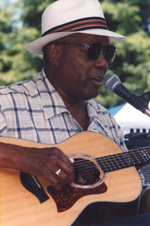
John Cephas
Hailed by The New York Times and other media outlets as “one of the outstanding exponents of the Piedmont style guitar,” Cephas was first exposed to the blues by his aunt while he was growing up. Although born in Washington, D.C. on Sept. 4, 1930, Cephas was raised in Bowling Green, a community from which he derived his nickname. There he learned from his grandfather the folklore of eastern Virginia — where his ancestors had toiled as slaves — and about the blues from his guitar-playing aunt. Listening to the blues as a child, Cephas sought to emulate the records he heard and, guided by a cousin, learned to play the guitar by ear.
While influenced by music from the ragtime era and such early regional blues artists as Blind Boy Fuller, Rev. Gary Davis, Blind Blake and Blind Lemon Jefferson, Cephas developed his own soft, delicate, alternating thumb-and- finger-picking style reflecting that of the Piedmont region – the foothills between the Appalachian Mountains and the Atlantic Coastal plain that extend from northern Virginia to Florida.
Cephas met his self-taught harmonica-playing musical partner, Phil Wiggins, 25 years his junior, during a Washington, D.C. jam session in 1977. Through the years, the duo recorded for a number of labels and played hundreds of major festivals, concert halls and even living rooms. They toured the world and were the first American artists to perform at the Russian National Folk Festival in Moscow during the days of the old Soviet Union. In 1987 they were hailed as the W.C. Handy Blues Entertainers of the Year. With a musical repertoire comprised of classic country blues and originals judiciously chosen to reflect the cultural and historical content of the Piedmont blues, Cephas and Wiggins sought to ensure that their live performances conveyed a sense of life in the post-Reconstruction South.
“The blues is a creation of black people in communities all across this country when times were bad,” Cephas noted in a bio that appears on the official Cephas and Wiggins website. “It was a way of expression, an outlet, and it’s had so much impact. Blues music is truth. The blues are true-to-life experiences that everyone can relate to.”
A recipient of a prestigious National Heritage Fellowship from the National Endowment of the Arts, Cephas also served on the executive committee of the National Council for the Traditional Arts, founded the Washington, D.C. Blues Society, and had a signature Taylor acoustic guitar named after him. However, “More than anything else,” he once stated, “I would like to see a revival of country blues by more young people … more people going to concerts, learning to play the music. That’s why I stay in the field of traditional music. I don’t want it to die.”
John Cephas may have left us, but there are other artists on the circuit today seeking to ensure that the music he so loved never does.

Like/Follow Us!